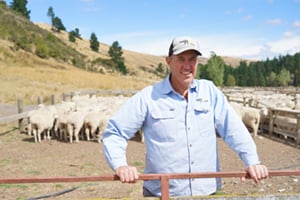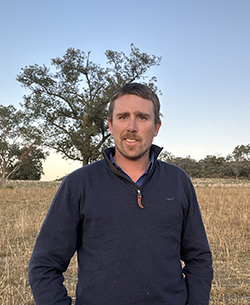Cattle webinars
Speaker: Mark Ferguson - neXtgen Agri
Mark Ferguson is the founder and CEO of neXtgen Agri - an innovation and consulting company that has clients across Australia and New Zealand.
Mark has 25 years experience in agriculture, holding a PhD in genetics and a passion for enabling farmers to impliment effective strategies to get the most out of their livestock. Mark grew up on a family property in the Victorian Mallee, and now lives with his family in Christchurch, New Zealand.
Key points:
- Understanding and embracing change in agriculture
- What will a successful farm business look like in the future?
- Available and emerging technologies that will add value to livestock businesses.
Date and time: 11 September 2024, 7.00pm AEST
Speaker: Elke Hocking, Elke Hocking Consulting
Elke is a private consultant with over 20 years’ experience, having worked in public and private sectors in research, development and adoption roles across the livestock industry. Additional to providing consultancy services, Elke holds a number of industry committee positions and runs a prime lamb and beef cattle enterprise with her husband at Lucindale. Elke is passionate about producers being able to profitably and sustainably produce high yielding beef and lamb that meets consumers’ expectations in terms of eating quality, nutrition and safety through the adoption of new technology, best practice production systems, value-based trading and a positive, professional approach to business.
This webinar brings together findings from various MLA funded projects focusing on managing the health and reproductive performance of heifers to optimise whole herd productivity.
The webinar covers:
- Proactively managing weaner heifers to achieve critical mating weight targets and condition scores prior to joining to improve the reproduction rates in their heifers and second calving cows.
- Developing an annual management and health plan for your beef business, to optimise the health and welfare, reduce mortality rates, achieve target liveweights and realise the genetic potential of your herd.
- The importance of measuring and monitoring liveweight, body condition score (BCS), pasture quality and quantity, animal health, calving time and genetics for managing reproductive performance.
Date and time: Wednesday 14 August 2024, 7.00pm AEST
Callen is a consultant with AgSTAR Projects, working with producers, advisors and industry professionals to improve on-farm outcomes through targeted extension. Callen has held various roles agronomy and farm advisory roles in both the public and private sectors. Callen and his wife Maria also run a beef breeding and backgrounding operation in Condobolin, NSW.
This webinar covers:
- What opportunities exist in the Dairy-Beef supply chain.
- The key factors for profitably producing beef from dairy animals.
- The industry requirements to further develop a Dairy-Beef supply chain.
Date and time: 10 July 2024, 7.00pm AEST
There are many factors that affect the success rate of an AI program.
In this webinar, Shane Thompson from Holbrook Vet Clinic takes the audience through:
- An introduction in fixed time AI programs and why they are beneficial
- What causes variation
- Take home recommendations on optimising outcomes.
Date: Wednesday, 8 June 2022
Time: 8.00pm AEST
Presenter: Dr Paul Nilon
Details: Join Dr Paul Nilon, Nilon Farm Health as we explore key cattle diseases and vaccination considerations for southern beef producers. He will discuss:
Vaccination programs - what should southern producers be considering
- Vaccination return-on-investment
- Emerging threats and future disease considerations.
Title: Acidosis in beef cattle on pasture
Date: Wednesday 30 June 2021
Time: 8.00pm AEST
Presenters: Owen Rees, Total Result Ag Consulting
Details: Cattle are at greatest risk for acidosis when consuming feed that is high in fermentable carbohydrates such as grain (i.e. grain overload), however acidosis can also affect cattle grazing high quality pasture.
Owen Rees from Total Result Ag Consulting takes the audience through:
- The types of acidosis and the symptoms to look out for
- What causes acidosis in cattle on pasture
- How to prevent acidosis to minimise production losses.
Date: Wednesday December 1st 2021
Time: 8.00pm AEDT
Presenters: Peta Bradley and Angus Burnett-Smith
Details: This webinar panel consisting of genetic and visual animal selection experts will provide an overview as to what to look for when purchasing breeding stock. Peta Bradley of MLA will delve into genetic evaluation of stock whilst Angus Burnett-Smith will touch on the visual aspect of selection.
The following information and associated links will be available on the MLA website with the webinar recording.
- MLA’s Genetics Hub provides information to get started understanding breeding values and indexes.
- The Bred Well Fed Well course.
- Profitable Grazing Management courses e.g. Building Better Breeders.
Meat Standards Australia (MSA) was developed by the Australian red meat industry to improve the eating quality consistency of beef and sheepmeat.
Laura Garland from MLA provides an update on the MSA program, how it continues to create opportunities for producers and how to make the most of your carcase data.
Key points will include:
- Changes we've made to vendor declarations and how to access those.
- Updates to the MSA model
- Using myMSA and it's reporting and benchmarking features to monitor carcase performance.
Having a heifer management plan in place from pre-joining to calving is essential to improve the overall reproductive performance of breeding herds. In this jam-packed webinar, Wayne Pitchford from the university of Adelaide takes the audience through:
- Selecting heifers to remain in the breeding herd
- Tips to improve heifer conceptions rates
- Tips heifer calving performance.
The experiences and method of achieving weight gain targets of >1kg/hd/day in weaner cattle discussed in this webinar may not be the only means of achieving this performance target. Experience of producers and advisors may differ and the most economically sound approach will be dependent on the specific circumstances and market conditions at the time.
Presenters: Tom Thorn, Total Result Ag Consulting
Details: Tom Thorn from Total Result Ag Consulting will take the audience through how to target 1kg/hd/day over winter in weaner cattle. Tom will address pasture and supplement feed quality and quantity as well as animal health considerations.
In this webinar, Lexie Leonard from Livestock Logic will talk the audience through pink eye management in weaner cattle and discuss what prevention and treatment options are available. Lexie will delve into:
- The contributing factors that lead to pinkeye outbreaks
- Prevention strategies and the role of vaccine and why the commercial vaccine has become less effective on some properties
- When treatment is worthwhile and what is recommended treatment
Under live webinar conditions, incorrect information was provided in this webinar about specific drench products and their impact on dung beetles. Cydectin, the product in question, has an on label registration that outlines the following with regard to dung beetle impacts:
When applied as directed, the levels of [Cydectin cattle products] in the faeces of treated cattle are not likely to have any significant adverse effects on the following dung beetles: Onthophagus gazella, O.taurus, Euoniticellus intermedius and E.fulvus. Effects on other dung beetle species have not been fully evaluated.
For information specific to Cydectin’s impact on dung beetles, please refer to the Virbac Website or research referenced on their website to support the information provided. For independent information regarding the effects of various animal health products on dung beetle populations, please refer to WormBoss. For additional independent information about dung beetles generally, various resources are available on the MLA website.
Dr Alison Gunn of Herd Solutions discusses the management options for calf scours this breeding season, including:
- When are alf scours likely to occur and what are the impacts?
- How to identify and diagnose calf scours?
- What are the recommended prevention strategies?
Dr Paul Nilon of Nilon Farm Health discusses the management options for grass tetany in cattle. Paul answers the questions:
- What is grass tetany and when does it occur?
- How do I manage grass tetany in my herd?
Dr Bruce Allworth of Charles Sturt University discusses the management options for bloat in cattle, including:
- What is bloat and why does it occur?
- What are the most cost effective management options?
Dr Michael McGowan of the University of Queensland discusses the common reproductive diseases in cattle and answers the following questions:
- What is the normal rate of loss between pregnancy testing through calf marking?
- If you are outside these rates what are the most prevalent disease related causes and how do you ensure a program to minimise their impact?
- What are some of the less common issues, and what to do about it.
In this webinar, John Webb-Ware of the McKinnon Project reports on the drench resistance situation as it is currently known and gives recommendations for managing the development of drench resistance on beef farms.
In this webinar, Ben Linn from the McKinnon Project discusses the dilemma of feeding weaner cattle. Ben delves into:
- Should weaner cattle be production fed or maintenance fed?
- What is the most cost-effective production ration?
- What is the most cost-effective maintenance ration?
Dr Paul Nilon of Nilon Farm Health discusses the importance of condition scoring cattle and setting condition score targets throughout winter. Other key points include:
- What is conditioning scoring
- How to condition score
- The uses of condition scoring
- Setting condition score targets for reproduction stages
- Nutritional planning
- Meeting minimal animal welfare standards.

 Speaker: Mark Ferguson - neXtgen Agri
Speaker: Mark Ferguson - neXtgen Agri Speaker: Elke Hocking, Elke Hocking Consulting
Speaker: Elke Hocking, Elke Hocking Consulting Callen is a consultant with AgSTAR Projects, working with producers, advisors and industry professionals to improve on-farm outcomes through targeted extension. Callen has held various roles agronomy and farm advisory roles in both the public and private sectors. Callen and his wife Maria also run a beef breeding and backgrounding operation in Condobolin, NSW.
Callen is a consultant with AgSTAR Projects, working with producers, advisors and industry professionals to improve on-farm outcomes through targeted extension. Callen has held various roles agronomy and farm advisory roles in both the public and private sectors. Callen and his wife Maria also run a beef breeding and backgrounding operation in Condobolin, NSW. 
